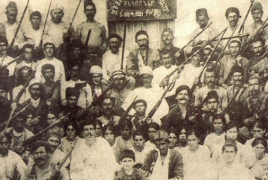How Greeks’ attempt to send Cilician Armenians weapons failed in 1913 May 27, 2015 - 16:26 AMT PanARMENIAN.Net - An interesting episode in the history of Armenian-Greek friendship and military cooperation turned to be fatal on the threshold of the Armenian Genocide. During that period in 1910-1915 prominent political figure Eleftherios Venizelos (1864 - 1936) was the Greek Prime Minister, who, being one of the best friends of the Armenian people, attached great importance to supporting and cooperating with them against the Turkish rule, armeniangenocide100.org reports. According to Mshak newspaper, a Greek steamship, loaded with weapons and ammunition (some sources say 7000 rifles) departed for Cilicia in November 1913, to give them to Armenians. Learning about this, the commander of the German naval forces in the Mediterranean Sea left for Cilician coast to prevent the unloading. On the threshold of the World War I, Germany, the ally of the Ottoman Empire, could not allow armament of the Armenians. But things did not lead to German intervention. According to Mshak, Armenians, “obeying their religious authorities’ warnings and not thinking about rebellion in general,” did not go to accept the weapons. Thus, the steamship approached the shores near Mersin and left as no one came to meet. Before that, however, the local Turks had already learnt about the steamship’s arrival and its purpose and started to threaten Armenians: the latter were afraid that the 1909 Adana massacres could repeat. Although the German admiral could not stop the Greek steamer, he heard of Turks’ anti-Armenian activities, visited the governor of Adana and reportedly threatened to bombard the province in case Armenians were slaughtered and said “Germany will stop supporting Turkey against Russia.” It is unknown how the German command would really act in case Armenians were slaughtered then. However, in the period when the reforms in the Armenian provinces in Turkey were in the center of diplomatic dispute in European superpowers, Germany, previously passive and mainly supportingTurkey, came to support reforms. It aimed to bereave Russia, Great Britain and France to rule the reform process on the one hand, and to divert the Western Armenians’ sympathy to its side on the other. (The German-Armenian society was established in 1914 in Germany, presided over by prominent social activist and humanist Johannes Lepsius). Already in 1915, Germany pursued a policy of indifference and permissiveness towards its military ally in the issue concerning the massacres and forced deportation of Armenians. As Mshak reported, citing Greek sources, the ship conveying the weapons belonged to a private person and no political meaning was attached to it appearing on Mersin shores. Although the fact of declining the Greek military support refutes one of the widely spread theses of Turkish denialism, i.e. the Armenians’ rebellion, it should be noted that the Armenians had the full moral and legal right to take up arms and fight against the Turkish dictatorship and the policy of extermination after the state anti-Armenian genocidal policy was implemented in the era of Abdul Hamid. Events, however, took a different course and due to certain reasons the Armenians in the Ottoman Empire, including those in Cilicia chose to rely on authorities on the eve of the WWI in order not anger them and solve the Armenian Question through the implementation of reforms. And the incident in Cilicia only proves, unfortunately, that Armenians were not ready to protect themselves against physical extermination and deportations ahead of the impending Genocide. Authorities said a total of 192 Azerbaijani troops were killed and 511 were wounded during Azerbaijan’s offensive. In 2023, the Azerbaijani government will increase the country’s defense budget by more than 1.1 billion manats ($650 million). The bill, published on Monday, is designed to "eliminate the shortcomings of an unreasonably broad interpretation of the key concept of "compatriot". The earthquake caused a temporary blackout, damaged many buildings and closed a number of rural roads. Partner news |